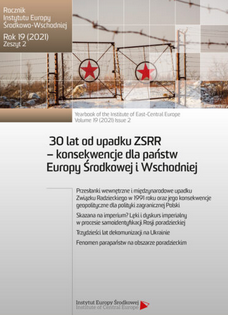Trzydzieści lat dekomunizacji na Ukrainie
Thirty years of decommunization in Ukraine
Author(s): Katarzyna JędraszczykSubject(s): Political history, Government/Political systems, Comparative politics, Transformation Period (1990 - 2010), Present Times (2010 - today), History of Communism, Politics of History/Memory, Peace and Conflict Studies
Published by: Instytut Europy Środkowej
Keywords: Ukraine; decommunization; memory; monuments; toponyms;
Summary/Abstract: The aim of the article is historical, political analysis and analysis of scientific discourse on the direction of decommunization transition since Ukraine’s independence. The main research question concerns the effectiveness of the process. When describing the decommunization of public space in Ukraine, it should be stressed that it was characterized by varying intensity and regionality. The process can be divided into two main phases – 1990-2014 and after 2015. The first period was determined by the historical policy pursued by the presidents of Ukraine. During the presidency of Yushchenko, with the increasing interest in historical politics, and especially the theme of Holodomor 1932/33, the names and monuments in honor of those responsible for these events were removed. The last phase of decommunization involves four acts passed in April 2015. The pace and consistency with which the laws were implemented, especially 317-VIII on communist symbolism, was linked to the Ukrainian-Russian conflict. It determined the need for radical steps towards the Ukrainian state taking control of its own symbolic space. A parliamentary majority and a social atmosphere have made the implementation of the laws effective and today Ukraine can be considered to have decommunized public space. This does not apply, of course, to occupied areas.
Journal: Rocznik Instytutu Europy Środkowo-Wschodniej
- Issue Year: 19/2021
- Issue No: 2
- Page Range: 125-145
- Page Count: 21
- Language: Polish

